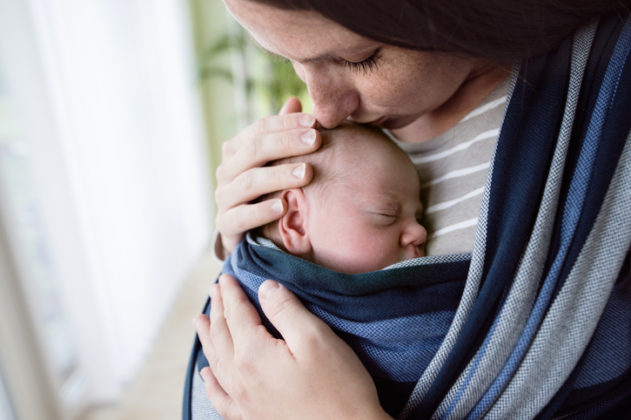The belief that women with disabilities are inherently unfit to become mothers has endured for centuries.
I am 35 years old, unmarried, and childless. For most women my age, this would mean incessant pressure to reproduce and regular reminders that the “clock is ticking.” But I have never experienced any of this. And while I find the pressure put on women abhorrent, the reason I have never experienced this is not a positive one.
I am never asked when I am going to have children because I have a physical disability (only my disabled friends have inquired).
The belief that women with disabilities are inherently unfit to become mothers has endured for centuries. In the infamous 1927 Buck v. Bell case, the United States Supreme Court ruled that it was Constitutional to forcibly sterilize women with disabilities. This repugnant decision rested on three overarching beliefs: (1) women with disabilities must be protected; (2) children must be protected; and (3) society must be protected. Shockingly, this case has never been overturned, meaning it is still considered good law, and is technically Constitutional. In fact, a handful of states still have involuntary sterilization laws on the books.
Ninety years since Buck v. Bell, far fewer women with disabilities experience forcible sterilization, but the practice has not completely ceased. Perhaps most notoriously, in 2004, a 6-year-old girl with intellectual disabilities (known as “Ashley X”) underwent a hysterectomy, breast bud removal surgery, and growth stunting hormone treatment. These horrible procedures were done to “protect her” from experiencing menstruation and ease in caring for her as she aged. Despite being a gross violation of civil rights, other children with disabilities have been forced to undergo similar procedures. And in any case, the ideology behind such practices — that people with disabilities should not have children — endures.
As noted by the National Council on Disability, “Today, women with disabilities contend with coercive tactics designed to encourage sterilization or abortions because they are deemed not fit for motherhood.” As a disabled woman, I have been offered a hysterectomy on more than one occasion. When I tell doctors that I plan to become a mother someday, they appear shocked. Although no doctor has outright told me not to have children, it is obvious that most doctors think I shouldn’t.
Women with disabilities are also presumed sexually unwilling or unable and often do not receive quality reproductive health care information or services. For example, research shows that disabled women are less likely to receive a Pap smear, compared to nondisabled women. Moreover, people with disabilities, especially people with intellectual disabilities, are often not provided meaningful sex education. These disparities have notable consequences: Rates of HIV and other sexually transmitted diseases are high among adults with disabilities.
This discrimination does not stop if a woman with a disability chooses to have children. In fact, in many ways, it actually increases.
Longstanding research shows that parents with disabilities experience significant discrimination, particularly within the child welfare and family law systems. Based on prejudiced and antiquated policies that presume unfitness, parents with disabilities are much more likely to be referred to the child welfare system and to have their children removed from their homes. Likewise, parents with disabilities often are denied custody or visitation of their children during divorce proceedings.
Take the example of Sara Gordon, a mother who had her child taken by the Massachusetts Department of Children and Families two days after giving birth. The reason? She missed a feeding. Oh, and she has an intellectual disability. Rather than giving this family a chance, the state just assumed she was incapable. Sara’s fight to regain custody endured for over two years and ended with the federal government intervening on her behalf.
Unfortunately, Sara’s experience is neither unique or uncommon. Indeed, many parents with disabilities will tell you that they live each day in fear that they will have their child taken by the state.
Discrimination is also rampant for people with disabilities who want to become parents through adoption or foster care. According to the National Council on Disability, the adoption and foster care systems are riddled with bias and speculation about disability that prevents countless prospective parents with disabilities from adopting or becoming foster care parents. This is particularly disheartening given the hundreds of thousands of children who linger in foster care, waiting for someone to take them in.
The discrimination parents with disabilities face is frightening to me. Both my partner and I have disabilities, and I fear the likely bias we will experience as we navigate parenthood in the future. I also know that as an attorney with resources and a strong understanding of my rights, I have immense privilege. What happens to the many disabled parents who are less fortunate?
Despite the many advances in disability rights, society still refuses to see us as capable parents. Rather than seeing people with disabilities as able to provide care, we are too often assumed to simply be the recipients of care. We are viewed as dependent, in need of protection, and incompetent, rather than capable, strong, and nurturing.
These negative perceptions are wrapped up in damaging expectations of mothers in general. Mothers are expected to know from day one everything their child needs and how to provide it, and they are often expected to take on the majority of parenting responsibilities and to be happy about it. At the same time, they are asked to be selfless at all times. In sum, mothers are expected to be perfect.
But the truth is, disability or not, no mother is perfect — and that’s perfectly ok.
Robyn Powell is a proud disabled woman, feminist, attorney, researcher, and freelance writer.
This originally appeared on The Establishment. Republished here with permission.
Other Links:

